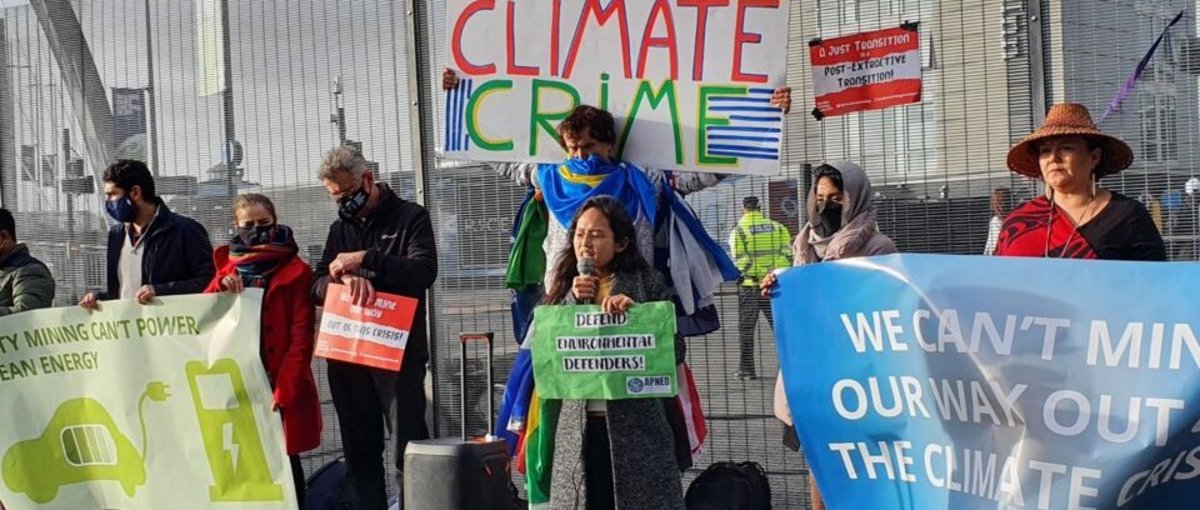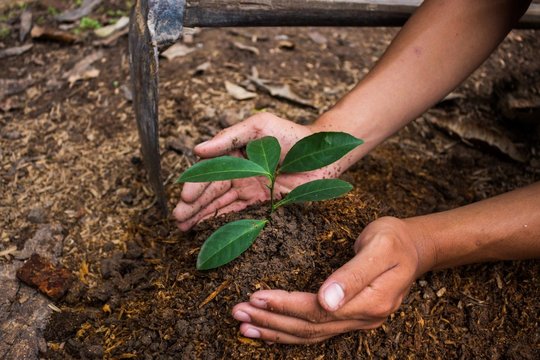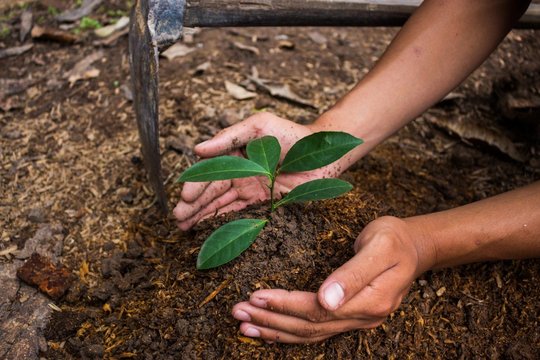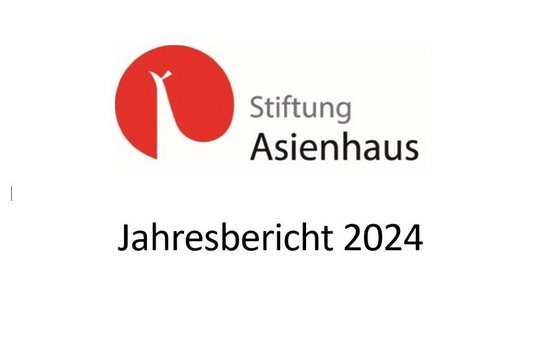The 90-minute event was moderated by Majid Lenz (Stiftung Asienhaus) and the two speakers Tala Batangan (Reality of Aid - Asia Pacific) and Julia Behrens (Postdoc Fellow University of Bielefeld) introduced us to ecological challenges, raised concerns of local communities and of climate activists in repressive states.
Challenges in decolonizing climate finance in Southeast Asia
 Due to quantitative and qualitative deficits in the current funding landscape, decolonization of climate finance, especially for Southeast Asia, is of great urgency, Tala Batangan said. Donor countries, which share a historic responsibility and have committed to provide $100 billion annually by 2020, have not fulfilled this commitment, and the amounts mobilized are only about $83.3 billion. This amount is far from sufficient, as developing countries actually need 5.9 trillion US dollars by 2030 to counter the effects of climate change (Photo: © Stiftung Asienhaus).
Due to quantitative and qualitative deficits in the current funding landscape, decolonization of climate finance, especially for Southeast Asia, is of great urgency, Tala Batangan said. Donor countries, which share a historic responsibility and have committed to provide $100 billion annually by 2020, have not fulfilled this commitment, and the amounts mobilized are only about $83.3 billion. This amount is far from sufficient, as developing countries actually need 5.9 trillion US dollars by 2030 to counter the effects of climate change (Photo: © Stiftung Asienhaus).
Climate finance is not only unevenly distributed, but often relies on existing funds. In addition, there are qualitative problems, as a considerable part of the financing is given in the form of loans instead of grants, which leads to an increasing indebtedness of developing countries. Moreover, the entry of the private sector and multilateral development banks is accompanied by political conditions that promote privatization, deregulation and liberalization.
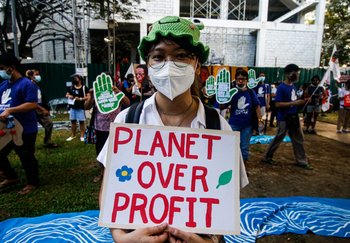 Often, financing pursues dubious market-based solutions, such as carbon capture, waste-to-energy and large hydroelectric dams, which are ineffective and exacerbate the climate crisis. Renewable energy projects are also driven by public-private partnerships, which attract foreign investors and promote the privatization of energy resources. Of particular note is the Asian Development Bank's (ADB) Energy Transition Mechanism (ETM), which provides loans to coal companies to close coal-fired power plants early. A measure criticized by civil society as putting corporate interests above people's concerns (Photo: © 350.org, Flickr, CC BY-NC-SA 2.0).
Often, financing pursues dubious market-based solutions, such as carbon capture, waste-to-energy and large hydroelectric dams, which are ineffective and exacerbate the climate crisis. Renewable energy projects are also driven by public-private partnerships, which attract foreign investors and promote the privatization of energy resources. Of particular note is the Asian Development Bank's (ADB) Energy Transition Mechanism (ETM), which provides loans to coal companies to close coal-fired power plants early. A measure criticized by civil society as putting corporate interests above people's concerns (Photo: © 350.org, Flickr, CC BY-NC-SA 2.0).
The diversity of civil society and its challenges
Understanding the diversity of international actors, which include governments, development banks, and nongovernmental organizations, is critical, Julia Behrens emphasizes, to understanding the relationship between these actors, civil society, and authoritarian states and their influence on climate action. One challenge for civil society is to precisely define the term "civil society" in a global context. Although it serves as an effective communication tool in international fora, the meaning of the term varies considerably in different regions. For example, there are strong differences in the understanding of civil society between Germany and Vietnam.
 The diversity of manifestations of civil society is largely shaped by international networks and local conditions. The effectiveness of civil society organizations is strongly dependent on their dependence on international actors and funding as well as the influences of international treaties and agreements. In particular, according to Behrens, international developments have in the past decisively influenced the local situation in negotiations and the representation of political interests. These complex dynamics underline the continuing challenge of International Civil Society and its adaptability to global developments (Photo: © Anonym).
The diversity of manifestations of civil society is largely shaped by international networks and local conditions. The effectiveness of civil society organizations is strongly dependent on their dependence on international actors and funding as well as the influences of international treaties and agreements. In particular, according to Behrens, international developments have in the past decisively influenced the local situation in negotiations and the representation of political interests. These complex dynamics underline the continuing challenge of International Civil Society and its adaptability to global developments (Photo: © Anonym).
Following the presentations by Tala Batangan and Julia Behrens, a lively discussion developed, the results of which will be examined in more detail in the coming sections.
The role of the EU and China's influence in Southeast Asia
China has established itself as an important global superpower through major infrastructure projects in Southeast Asia. Chinese involvement extends to funding key projects such as highways and hydropower plants. Despite the economic benefits, these initiatives face opposition from local communities due to environmental concerns, highlighting the challenges for China to balance its global leadership with local concerns and environmental impacts. The motivation for China's involvement, according to Batangan, would be to strategically counter the US and pursue its own interests in the areas of development and climate.
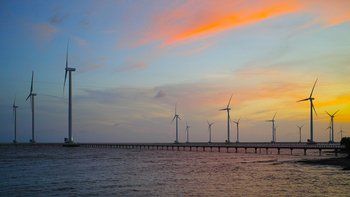 In the context of the EU Green Deal, the potential impact on populations in the Global South is seen as a possible continuation of colonial structures, Tala Batangan underlined. The fear is that the Green Deal could inadvertently lead to a continuation of colonial power structures if it is enforced without proper consultation and consideration of local needs. This underlines the need for a participatory approach and respectful dialogue in international climate and development initiatives (Photo: © Shansov. CC BY SA).
In the context of the EU Green Deal, the potential impact on populations in the Global South is seen as a possible continuation of colonial structures, Tala Batangan underlined. The fear is that the Green Deal could inadvertently lead to a continuation of colonial power structures if it is enforced without proper consultation and consideration of local needs. This underlines the need for a participatory approach and respectful dialogue in international climate and development initiatives (Photo: © Shansov. CC BY SA).
In summary, the discussion on the role of the EU and China's influence in Southeast Asia highlights the complexity of global dynamics. While China is strengthening its power position through ambitious infrastructure projects, the EU is contributing significantly to global climate policy through the Green Deal. The challenge is to ensure that these initiatives not only serve economic interests, but also adequately engage local populations and consider environmental impacts to ensure sustainable development in the region.
Perspectives on loss and damage
 The Fund for Loss and Damage through Climate Change (Loss and Damage) was highlighted by Tala Batangan as a significant step in international climate finance that could positively contribute to addressing climate change impacts in developing countries. The fund has the potential to provide much-needed financial resources to communities and nations most affected by climate-related disasters. Nevertheless, extreme caution should be exercised in financing the fund to avoid inequitable structures. This would include the targeted provision of public financing in the form of grants rather than loans to prevent additional indebtedness of financially weak developing countries. It would be necessary to ensure that the fund serves as an additional source of financing and focuses on the needs of those most affected. In addition, there is a risk that the fund will be used for corporate profit maximization. Accordingly, transparency and strict audits for funded projects and initiatives are needed. The protection of human rights should be a priority in the design and implementation of the fund to ensure that the funds strengthen the resilience of vulnerable communities and protect their livelihoods. Overall, successful use of the fund requires careful design to ensure equitable, effective, and sustainable climate finance (Photo: © Jörg Dietze, SuSanA Secretary, Flickr CC BY-NC-SA 2.0).
The Fund for Loss and Damage through Climate Change (Loss and Damage) was highlighted by Tala Batangan as a significant step in international climate finance that could positively contribute to addressing climate change impacts in developing countries. The fund has the potential to provide much-needed financial resources to communities and nations most affected by climate-related disasters. Nevertheless, extreme caution should be exercised in financing the fund to avoid inequitable structures. This would include the targeted provision of public financing in the form of grants rather than loans to prevent additional indebtedness of financially weak developing countries. It would be necessary to ensure that the fund serves as an additional source of financing and focuses on the needs of those most affected. In addition, there is a risk that the fund will be used for corporate profit maximization. Accordingly, transparency and strict audits for funded projects and initiatives are needed. The protection of human rights should be a priority in the design and implementation of the fund to ensure that the funds strengthen the resilience of vulnerable communities and protect their livelihoods. Overall, successful use of the fund requires careful design to ensure equitable, effective, and sustainable climate finance (Photo: © Jörg Dietze, SuSanA Secretary, Flickr CC BY-NC-SA 2.0).
JET-P and possible suppression of activists
Concerns have been raised about possible repression of activists under the Just Energy Transition Partnership (JET-P), particularly in countries such as Vietnam. Although the JET-P has not yet been fully implemented, the discourse suggests that individuals from civil society and non-governmental organizations involved in consultative functions and representing critical viewpoints may be exposed to potential risks. There is therefore an urgent need for careful monitoring of initiatives such as the JET-P for their potential impact on activists and community representatives in authoritarian contexts. The urgency of this monitoring, according to Behrens, would be to ensure that partnerships such as the JET-P do not inadvertently serve as instruments to restrict freedom of expression. Ensuring the protection of activists who hold critical views is a top priority. It is therefore necessary to implement mechanisms to ensure that such partnerships do not lead to these activists being put at risk or having their rights compromised.
In summary, the webinar highlighted the pressing challenges in climate finance and the multi-faceted issues facing civil society in a world dominated by economic interests. It emphasized the need for a prudent and responsible approach to international initiatives and partnerships to shape equitable, effective, and sustainable climate policy.
The event was hosted by Stiftung Asienhaus and philippinenbüro in cooperation with the Heinrich Böll Foundation. The webinar complements the issue "Climate in Change - Society on the Move" of the online magazine südostasien.
Report: Saskia Loges


